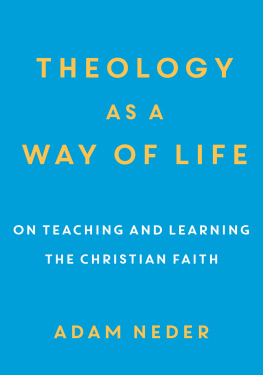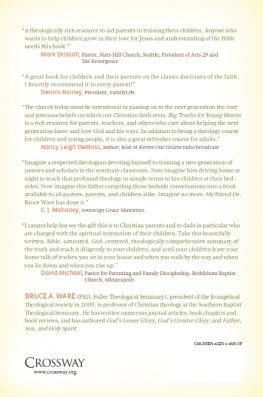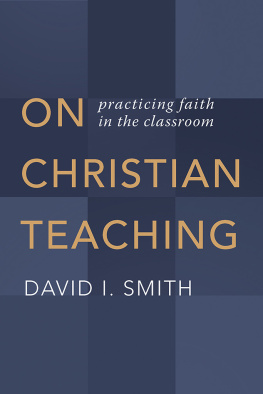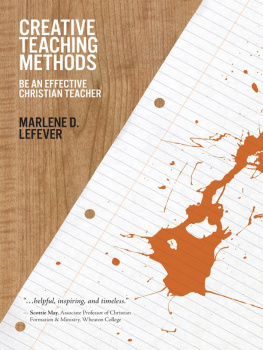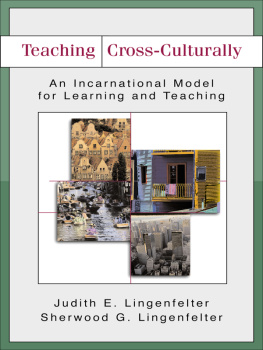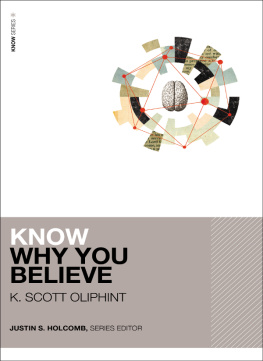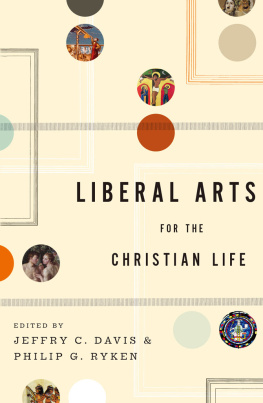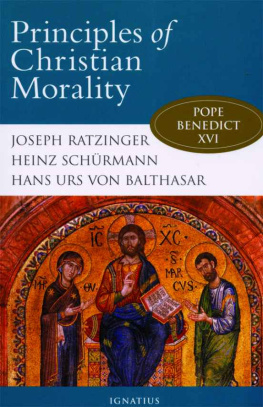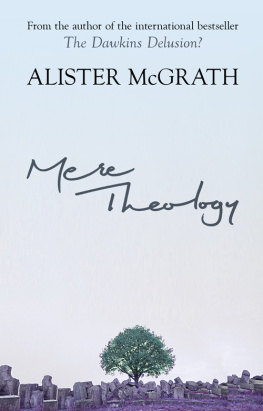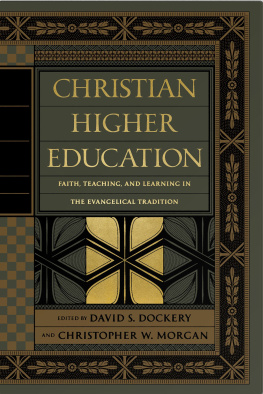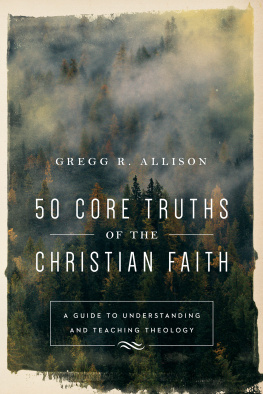Adam Neder - Theology as a Way of Life: On Teaching and Learning the Christian Faith
Here you can read online Adam Neder - Theology as a Way of Life: On Teaching and Learning the Christian Faith full text of the book (entire story) in english for free. Download pdf and epub, get meaning, cover and reviews about this ebook. year: 2019, publisher: Baker Publishing Group, genre: Religion. Description of the work, (preface) as well as reviews are available. Best literature library LitArk.com created for fans of good reading and offers a wide selection of genres:
Romance novel
Science fiction
Adventure
Detective
Science
History
Home and family
Prose
Art
Politics
Computer
Non-fiction
Religion
Business
Children
Humor
Choose a favorite category and find really read worthwhile books. Enjoy immersion in the world of imagination, feel the emotions of the characters or learn something new for yourself, make an fascinating discovery.
- Book:Theology as a Way of Life: On Teaching and Learning the Christian Faith
- Author:
- Publisher:Baker Publishing Group
- Genre:
- Year:2019
- Rating:5 / 5
- Favourites:Add to favourites
- Your mark:
- 100
- 1
- 2
- 3
- 4
- 5
Theology as a Way of Life: On Teaching and Learning the Christian Faith: summary, description and annotation
We offer to read an annotation, description, summary or preface (depends on what the author of the book "Theology as a Way of Life: On Teaching and Learning the Christian Faith" wrote himself). If you haven't found the necessary information about the book — write in the comments, we will try to find it.
Adam Neder: author's other books
Who wrote Theology as a Way of Life: On Teaching and Learning the Christian Faith? Find out the surname, the name of the author of the book and a list of all author's works by series.
Theology as a Way of Life: On Teaching and Learning the Christian Faith — read online for free the complete book (whole text) full work
Below is the text of the book, divided by pages. System saving the place of the last page read, allows you to conveniently read the book "Theology as a Way of Life: On Teaching and Learning the Christian Faith" online for free, without having to search again every time where you left off. Put a bookmark, and you can go to the page where you finished reading at any time.
Font size:
Interval:
Bookmark:
This is a beautiful page-turner of a book, a must-read for all who engage in teaching the Christian faith. Whether you are in the church or the classroom, just embarking upon your calling or have been teaching for decades, Neders powerful, grace-bathed theological reflections on teaching the Christian faith will impact why and how you do what you do.
Kristen Deede Johnson , Western Theological Seminary
Here is a volume of warmth and wisdom on teaching theology. Drawing heavily on the insight of figures like Barth, Bonhoeffer, and Kierkegaard, Neder points us to lived theology that is personal and vibrant, honest and faithful. Encouragementsand warningsbounce off the pages as Neder provides tried and tested counsel on good teaching and healthy classroom practices, all done with and before the triune God: we have much to learn from him!
Kelly M. Kapic , Covenant College; author of A Little Book for New Theologians
The person you meet in this book is a deeply serious, self-critical Christian gentleman, who is passionately discipled to the person and work of Jesus Christ and who yearns for the discipline of theology to be taught compassionately, intelligently, and engagingly. If Neder were to write a comprehensive account of Christian theology, I would be as eager to read it as I once was to read Karl Barths Church Dogmatics.
Frederick Dale Bruner , Union Theological Seminary, Philippines, and Whitworth University (emeritus)
What does it mean to be in Christ? Neder wonders what it means to teach in Christ. For those of us in academia or pastoring a congregation, this comes as both a challenge and a gift. Neder joins Barths ever-present call to theological existence in which not just the content but the praxis of our teaching is changed by the person of Christ. Prayer, personal integration, humility, and even publishing are discussed in this light (with the help of World Cup and Radiohead analogies). As Neder says, Teaching Christianity is an act of love. So is this book.
Julie Canlis , Whitworth University
2019 by Adam Neder
Published by Baker Academic
a division of Baker Publishing Group
PO Box 6287, Grand Rapids, MI 49516-6287
www.bakeracademic.com
Ebook edition created 2019
All rights reserved. No part of this publication may be reproduced, stored in a retrieval system, or transmitted in any form or by any meansfor example, electronic, photocopy, recordingwithout the prior written permission of the publisher. The only exception is brief quotations in printed reviews.
Library of Congress Cataloging-in-Publication Data is on file at the Library of Congress, Washington, DC.
ISBN 978-1-4934-1978-4
Scripture quotations are from the New Revised Standard Version of the Bible, copyright 1989 National Council of the Churches of Christ in the United States of America. Used by permission. All rights reserved.
For Reginald McLelland
and Bruce McCormack
Cover
Endorsements
Half Title Page
Title Page
Copyright Page
Dedication
Abbreviations
Introduction
1. Identity
2. Knowledge
3. Ethos
4. Danger
5. Conversation
Bibliography
Index
Back Cover
| CD | Church Dogmatics |
| DBWE | Dietrich Bonhoeffer Works |
| ET | Evangelical Theology: An Introduction |
| KJN | Kierkegaards Journals and Notebooks |
| rev. | revised translation |
T his book began as a paper for the annual Karl Barth conference at Princeton Theological Seminary in 2012. The theme of the conference was Barths book Evangelical Theology , which contains the lectures he gave during his only visit to the United States. search for books that could help me think seriously about teaching Christian theology proved far more difficult than I had imagined, which seemed strange to me. When so much theological education happens in classrooms, why havent theologians written persuasively about what goes on there? Shouldnt we have numerous good books about teaching theology? We have good books about education and teaching in general, about Christian liberal arts education, and about the history of theological education, but none written by a contemporary theologian about the art of teaching Christian theology. Yet without a compelling theological vision of what it means to teach Christian theology well, and without a clear awareness of its unique challenges and temptations, our instruction will be out of joint with the subject matter, and valuable opportunities will be wasted.
Eventually I decided that if no one else was going to write the book, then I would. Not because I think I am an especially good teacher. Anyone who claims to have mastered the art of teaching Christianity is a fool. No one possesses the necessary knowledge, wisdom, eloquence, or imagination. Only the self-deceived arrive at the end of a semester thinking a course went as well as it could have gone. Anyone who doesnt find it strange that he or she should be the one to stand in front of a group of people and talk about God is either deluded or hasnt thought very deeply about what is happening. No one has the power to make God present. Everyone persuades people to believe things that are not true. Every teachers life somehow contradicts the subject matter. At some point, every teacher leads students away from God.
I didnt write this book because I think I am an exception to any of this. Whatever authority I possess is merely the result of trying to think carefully about the difference Jesus Christ makes for theological education. If he is truly God and truly human, if he reveals God to us and us to ourselves, if through him God was pleased to reconcile to himself all things (Col. 1:20), then how should that influence the way we think about teaching the Christian faith? How do we develop a specifically Christian approach to teaching Christian theology? This book is the result of years of struggling with this question, however unsatisfactorily.
Please dont think this is false humility. I have been a professor at Whitworth University for the past sixteen years. Most of my students think I am a good teacher. I know that because they tell me so and because they write sweet things in their course evaluations. But But if teachers are incapable of accomplishing our most basic task, of achieving our most important goal, shouldnt that shape the way we teach? And if so, how?
Much recent thinking conceives Christian education as largely a process of socialization in which students are habituated into the Christian life through repetitive practices that lead to virtue. The approach is broadly Augustinian and has numerous strengths. James K. A. Smith is its most influential proponent. Christian education aims to reeducate desire through the cultivation of habit-forming practices that orient students precognitive assumptions about the world toward the kingdom of God.
There is much to agree with and appreciate in Smiths work, and our goals overlap significantly, but readers familiar with Smiths books will find themselves in a different atmosphere here. The core theological claim of this book is that Jesus Christ establishes the truth of human identity in his life, death, and resurrection. We are who we are because Jesus is who he is. That is an objective fact that is true about everyonea reality acknowledged and enacted by individuals as the Holy Spirit awakens and empowers them to discover and embrace their lives in Christ, to become who they already are in him. I introduce this position in the first chapter, and the rest of the book unfolds from there. Smiths thesis that we are shaped by our habitual liturgies seems clearly correct to me, and it is true that in a certain sense we are what we love. But in the soil of Smiths more traditional anthropology, becoming who we are means something different than it does to someone operating with the kind of christological anthropology that animates my work, and this leads to important differences in our respective approaches. I dont intend this as a criticism, and I dont think Smith will receive it as one, since we develop our anthropologies from such obviously different starting points. We need more people engaged in the kind of work Smith is doing, and I certainly have no desire to criticize him. In fact, I think our approaches mutually enrich each others in helpful ways.
Font size:
Interval:
Bookmark:
Similar books «Theology as a Way of Life: On Teaching and Learning the Christian Faith»
Look at similar books to Theology as a Way of Life: On Teaching and Learning the Christian Faith. We have selected literature similar in name and meaning in the hope of providing readers with more options to find new, interesting, not yet read works.
Discussion, reviews of the book Theology as a Way of Life: On Teaching and Learning the Christian Faith and just readers' own opinions. Leave your comments, write what you think about the work, its meaning or the main characters. Specify what exactly you liked and what you didn't like, and why you think so.

